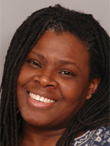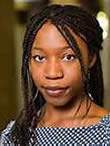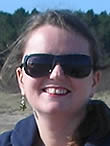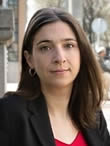 Dr Patricia Noxolo, Principal Investigator, University of Birmingham
Dr Patricia Noxolo, Principal Investigator, University of Birmingham
Dr Pat Noxolo is the lead researcher in the CARISCC network. Dr Noxolo’s research is at the confluence of international development, culture and in/security, and uses postcolonial, discursive and literary approaches to explore the spatialities of a range of Caribbean and British cultural practices.
Recent work has focused on theorizations of space in the novels of Wilson Harris, Maryse Condé and Earl Lovelace; on Caribbean laughter and materialities; on African-Caribbean dance as embodied mapping; and on securitisation in British development and immigration/asylum discourses. With over 20 years’ academic experience, Dr Noxolo has published extensively on the geographies of in/security, on Caribbean literature, and on African-Caribbean dance. She brings this confluence of conceptual and theoretical work, grounded in extensive knowledge of existing research in Caribbean Studies and in Critical Security Studies, to the CARISCC project.
Her vision as principal researcher is to shift the centre of the study of in/security, not only geographically (to the Caribbean as a middle-income region) but also disciplinarily: her vision is to reconsider in/security as a feature of everyday life that is negotiated through creative activity, not just through military or criminal manoeuvres. This vision, shared by the other members of the network, will drive the project forward intellectually.
Dr Noxolo is chair of the Society for Caribbean Studies , the UK's foremost learned society for Caribbean Studies, presiding over the inauguration of the Society's annual postgraduate conference, which complements its well-established annual conference. As such, she is at the head of a major network of postgraduate and postdoctoral Caribbean scholars, as well as having connections with Caribbeanists in the Americas and in the rest of Europe
 Dr Anyaa Anim-Addo, University of Leeds
Dr Anyaa Anim-Addo, University of Leeds
Dr Anim-Addo brings an explicitly historical perspective to the project. Anim-Addo’s research focuses on the Caribbean in the nineteenth-century Atlantic world, and particularly labour and leisure mobilities through the region in the post-emancipation period. Her publications include articles in Historical Geography, Island Studies and Mobilities. On the basis of archival research – particularly analysis of Colonial Office, Foreign Office, and maritime business manuscripts – Anim-Addo’s consideration of Caribbean in/securities explores: (i) the negotiation of everyday livelihoods in post-emancipation port towns; and (ii) competing European and American attempts to secure regional influence through commercial links and infrastructure. Anim-Addo is an Early Career Researcher with a track record in interdisciplinary research.
As a Senior Caird Research Fellow, she worked with curators at The National Maritime Museum, Greenwich, and has been based in both a Geography department (University of Sheffield) and a History department (University of Leeds). Anim-Addo is currently Co-Investigator on the interdisciplinary AHRC-funded Care for the Future project ‘Apologies for Historical Wrongs: When, How, Why?’ With input from scholars in Law, History and Sociology, this project examines the form, function and impact of apologies in dispute settlement. Dr Anim-Addo’s strand of ‘Apologies for Historical Wrongs’ analyses campaigns related to chattel slavery in the Caribbean. These campaigns form part of contemporary attempts to negotiate everyday insecurities in the region.
Dr Anim-Addo is conference coordinator for the Society for Caribbean Studies and her experience of working collaboratively with the Museums, Libraries and Archives sector will significantly inform the network's development and curation of materials for the touring exhibition in 2017.
 Dr Susan Mains, University of Dundee
Dr Susan Mains, University of Dundee
Susan Mains has extensive research experience in the Caribbean. Having taught at the University of the West Indies (UWI)-Mona from 2001-2010, she has a wide range of research connections within the Caribbean and South America in the area of political, cultural and urban geography, cultural studies, Caribbean literature, social justice and new social movements. These connections also include the wider UWI regional campuses (at Cave Hill-Barbados and St Augustine-Trinidad and Tobago), the Caribbean Studies Association, the Jamaican Geographical Society, Jamaica Environment Trust, Women in Film and Television-Jamaica (WIFTI), Catagena Cómovamos-Colombia, and the Centre of Caribbean Studies of Brazil (CEBAB).
Dr Mains has acted as member of the Caribbean Social Forum and the Association of American Geographers Americas advisory group. She recently collaborated with partners at Literary Dundee to host a special panel exploring Caribbean creative writing and is developing collaborations with Jamaican film makers in Dundee to explore shifting concepts of heritage, social justice, security and coastal landscapes. These networks will facilitate the inclusion of a wide range of Caribbean based academic scholars, organisations and individuals whose work and livelihoods are directly addressing concerns related to (in)security, and how these can be addressed in diverse and creative ways.
Susan Mains has also published in a range of international journals including Social and Cultural Geography, GeoJournal, Journal of Geography in Higher Education, The Singapore Journal of Tropical Geography, Small Axe: A Caribbean Journal of Criticism, and Caribbean Geography. She is the lead editor (with Julie Cupples and Chris Lukinbeal as co-editors) for a wide-ranging international anthology—Mediated Geographies and Geographies of Media (Springer, 2015-in press)—exploring the role, use and representations of media in a range of global settings.
Her previous work has been funded through the University of the West Indies, the Association of American Geographers and the American Geographical Society. Dr Mains has utilised a range of qualitative and participatory methods such as in-depth interviews, ethnography, participatory filmmaking, landscape interpretation, media analysis, and participant observation, which are supported through a range of resources and training facilities at the University of Dundee and through the Higher Education Academy (of which the university is a part, and for which Dr Mains has led training workshops). This methodological background also includes designing and undertaking international fieldwork, particularly in the Caribbean, UK, US and Mexico.
Susan Mains is currently the principal investigator for a Carnegie Trust funded project, “Ties to the Tay,” which utilises participatory filmmaking as part of a collaboration between an interdisciplinary group of academics at the University of Dundee, the Nethergate Writers, artists, and community organisations. In addition, Dr Mains is a partner in a collaborative project bridging the arts and sciences, which is integrating software applications (such as graph-based digital infrastructure), to understand creative activities in the Tayside catchment area. She is also a partner in a current Royal Society of Edinburgh funded collaborative project exploring representations of place and landscape connections between the Scottish Highlands and the Caribbean.
Dr Kevon Rhiney, Rutgers, The State University of New Jersey
Kevon Rhiney has close to ten years of experience conducting social research focused on sustainable development issues in the Caribbean. Past projects have looked at the vulnerability of small scale agrofood production systems and coastal tourism establishments to forces of global change.
Dr Rhiney is currently exploring the barriers and opportunities for integrating climate adaptation principles in disaster risk reduction planning and development practices in the insular Caribbean. Dr. Rhiney’s research also looks at human dimensions of climate change and how these intersect with a range of global economic forces. Dr Rhiney will make use of his institutional location and extensive Caribbean contacts to be a lynchpin for the network. In particular, he will host the Jamaican network meeting and the Jamaican end of the final conference.
Dr Rhiney's social science research, embedded within Caribbean institutions and field work, ensures that the research stays grounded in a range of aspects of Caribbean rural and urban life. At the same time, Dr Rhiney has been a visiting scholar at European universities, and has existing relationships with several of the other network members, ensuring a firm foundation for productive international dialogue.
 Dr David Featherstone, University of Glasgow
Dr David Featherstone, University of Glasgow
Dr David Featherstone has led intellectual debates in geography in relation to leading Caribbean intellectuals and political activists such as CLR James, Elma Francois, Claude McKay and George Padmore. He has drawn out the importance of their work for debates around resistance, space and politics and the making of solidarities. Further, he has developed pioneering readings of the work of James and McKay which tease out the importance of the spatial politics in their work.
He has engaged extensively with the political activity of different Caribbean radicals and networks, including in relation to maritime spaces. In this regard this engagement with Caribbean traditions of political theory and organising which challenge an intellectual context where regions like the Caribbean are frequently seen as a site to apply theory rather than seen as regions which have actively produced and negotiated theorising about security and insecurity. This engagement will bring a significant historical perspective to bear on debates on the geographies of security/insecurity. This will be especially significant in relation to engaging with the ways in which geographies of colonialism and anti-colonialism continue to shape debates on security/insecurity in the Caribbean. Exploring these contested lineages will provide a significant contribution to the intellectual direction and context of the network.
His engagement will also draw on his involvement in two Glasgow University conferences on CLR James’s Beyond a Boundary and the Black Jacobins which have been integral in shaping transnational networks of scholarship in relation to Caribbean intellectual history and geography. His role as a co-organiser of the Beyond a Boundary at Fifty conference involved developing connections with scholars at the UWI regional campuses (Aaron Kamguisha, at Cave Hill-Barbados, and Roy McCree, at St Augustine-Trinidad and Tobago). He is co-editing a book from this conference (with Chris Gair, Christian Hogsbjerg and Andy Smith) which includes contributions from leading James scholars including Hilary Beckles, UWI Vice-Chancellor, which is being prepared for Duke University Press’s CLR James Archive series.
David Featherstone has published in a range of international journals including Annals of the Association of American Geographers, Antipode, South African Historical Journal, Social and Cultural Geography, and Transactions of the Institute of British Geographers, and is the author of Resistance Space and Political Identities and Solidarity: Hidden Histories and Geographies of Internationalism. He serves on the editorial board of Soundings: a Journal of Politics and Culture, the International Advisory Board of Antipode and is the Human Geography editor of the RGS-IBG Book Series.
His previous work has been funded by the British Academy and the Joseph Rowntree Foundation. He has been active in shaping links beyond the academy through his research; for example, he has spoken about his research on black internationalism at the Glasgow African Caribbean Centre. His current research projects include Banner Tales, an ongoing collaboration with trade unionists and Glasgow museums, which is using participatory archiving methods to develop an engagement with the use of banners in struggles and organising in post-war Glasgow.
 Dr Rivke Jaffe, University of Amsterdam
Dr Rivke Jaffe, University of Amsterdam
Dr. Rivke Jaffe has extensive interdisciplinary experience researching the urban Caribbean, with specific expertise on crime and in/security. To understand how urban crime and violence are experienced and represented, she draws on extensive experience with ethnographic fieldwork in Caribbean cities, as well as a broad knowledge of Caribbean popular culture.
She is well-versed in both humanities and social science methods and has developed a strong interdisciplinary profile, as is evidenced by her collaborations in joint research, publications, conference organisation and funding applications with colleagues in history, literary criticism, cultural studies, and philosophy. She has also built a strong track record within Caribbean area studies within the Netherlands, through board memberships, editorial positions and conference organisation and participation.
She is currently the PI on two major Dutch/European funded research projects, the first researching the privatisation and pluralisation of security provision in five cities, including Kingston, Jamaica, and the second studying popular music, visual culture and the material culture through which the socio-political authority of criminal organisations in Latin America and the Caribbean is reproduced. She is also an associate researcher at the Institute for Criminal Justice and Security (ICJS) at the University of the West Indies, Mona, in Jamaica.
 Dr Ronald Cummings, Brock University
Dr Ronald Cummings, Brock University
Dr Ronald Cummings is an interdisciplinary scholar who has studied and taught in the Caribbean, the UK and North America. Before joining the faculty at Brock University, he was the inaugural Postdoctoral Fellow in Critical Caribbean Studies at Rutgers University. He has also served as an executive committee member of the Society for Caribbean Studies, UK, from 2010-2012.
He holds degrees in Literature and Cultural Studies. His ongoing research brings together the critical fields of Maroon Studies, queer studies, Caribbean and postcolonial literary discourse in order to examine the intersections of biopolitical, heteronormative, and colonial power in both colonial and postcolonial contexts. In particular, his current book project Queer Marronage and Caribbean Writing, which builds on his PhD thesis, draws on historical, anthropological and literary narratives of marraonge and examines narratives of runaway slaves and the resulting constructions of diverse and contingent communities of relation within plantation societies alongside contemporary discourses and mappings of queer Caribbean counterpublics. In bringing these two archives into conversation with each other, Cummings’s work argues for a relational understanding of queerness and marronage as contingent strategies of negotiating freedoms and survival in relation to colonial and heteronormative structures of control. The relational discussion of practices of queerness and marronage also lends to a rich engagement with the contingent and complex meanings of freedom and community at different historical moments in the Caribbean region’s history.
Dr Cummings has also published on issues of transnationalism and representations of gender and sexuality in the Caribbean literature and culture. His work has appeared in literary, anthropological and gender studies journals including the Journal of West Indian Literature and Transforming Anthropology. He is a member of the Department of English Language and Literature at Brock University as well as a faculty member in the Social Justice and Equity Studies Programme.